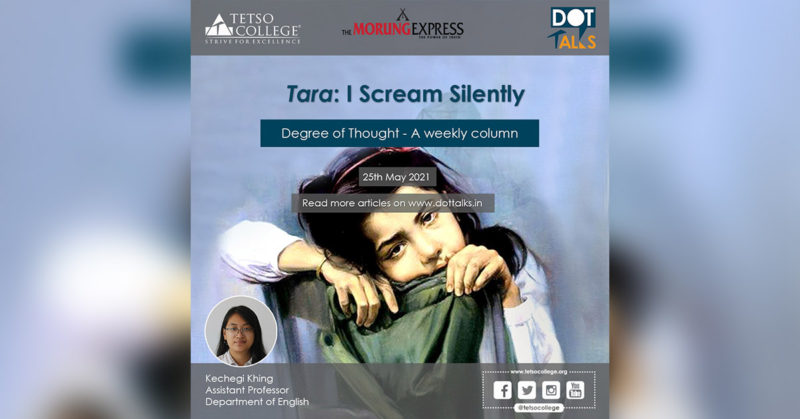 Tara was Mahesh Dattani’s third play which was written and also directed by him in its first show at Bangalore. When the play was staged at Mumbai it was directed by Alyaq Padamsee. This plays comments on the socio-cultural status of the women in the past as well as present. Tara encourages the audience to shed prejudices against women and develop a progressive outlook.
Tara was Mahesh Dattani’s third play which was written and also directed by him in its first show at Bangalore. When the play was staged at Mumbai it was directed by Alyaq Padamsee. This plays comments on the socio-cultural status of the women in the past as well as present. Tara encourages the audience to shed prejudices against women and develop a progressive outlook.
Tara: I Scream Silently
The world today is not how it had been. Technology has taken us far ahead and development in various fields. These we know and understand for sure that times have changed and advanced. And yet, unfortunately, we still struggle with some universal codes of life, irrespective of geographical location or demography. The story of bias and its parasitic effects on society has always popped on the news/media like pop-corn.
Literature has always been a means of voice to those screaming silently. And it is fascinating that some observant writers capture and present those silent voices to the mass. Tara, a two-act play by one of India’s finest English dramatists, Mahesh Dattani, uses contemporary sensational issues as a theme in his play. First performed as Twinkle Tara on October 23, 1990, at the Chowdiah Memorial Hall, Bangalore by Dattani’s Playpen Performing Arts Group. Later on November 9, 1991, it was performed as Tara by Theatre Group, Bombay at Sophia Bhabha Hall. The issue of gender discrimination is one of the key themes presented by Dattani in this play. Tara, the female protagonist, goes through injustice from the very point of her birth. The plot circles around the traditional issue of gender discrimination caused by the favor towards the male gender. Tara and her twin Chandan delivered from the same womb to an educated higher middle-class family in Bangalore. The twin, born conjoined, a boy and a girl with three legs, and the blood supply to the third leg was from the baby girl’s body. The family and Dr. Thakkar decided to fix the third leg to the baby boy’s body to make him whole, so they thought. Later, the third leg had to be removed and Chandan had to live with only one leg, just like his twin Tara. She had to survive with only one leg; injustice was done to her from birth due to gender discrimination in society. Another point on which Dattani shades light through this play is the role of gender designed by society.
When Chandan helps his mother unravel his mother’s knitting and keeps the wool in order, his father shouts at him and his mother, asserting that it should be Tara who helps the mother. In addition, the father decides to send his son Chandan to college while the prospects of his daughter Tara were barely a concern to him. Despite Tara’s visible intellectual abilities over her twin brother, she was forced to conform to the society’s predestined role of females, that is, household chores. The play puts forward the notion that a woman’s intellect cannot be accepted and in a way intimidates a man.
In a recent video on the YouTube channel Asian Boss, their street interview with Japanese female citizens shares their experiences and opinion including the fact that men get intimidated when they learn of the woman’s intellect. The woman’s chance to date or marry is lower if they are highly qualified or seemingly more intelligent or if they voice out their opinion. Women are forced to maintain and fit into the picture formulated by the male-dominated society. Just like Tara, whose scream to live and survive was silenced; injustice was done to her as a female but more importantly as a human being. Our society today is too busy to respect, too busy to look at the injustice and overlook the fact that ‘I’ am a human too. Yes, there are visible changes, but how long till the last baby girl dies before birth? How long till the last lady in her house is beaten to death? How long till the last woman cries for her lost job over her male counterpart despite her excellent work ethics and qualification? How long till the last woman…
‘I’ am a daughter, a sister, a mother, a wife, an employee, a citizen of the nation and ‘I’ am a human being. ‘I’ am Tara, can you hear me? can you help me?
Degree of Thought is a weekly community column initiated by Tetso College in partnership with The Morung Express. Degree of Thought will delve into the social, cultural, political and educational issues around us. The views expressed here do not reflect the opinion of the institution. Tetso College is a NAAC Accredited UGC recognised Commerce and Arts College. The editors are Dr Hewasa Lorin, Dr. Aniruddha Babar, Rinsit B Sareo, Meren Lemtur and Kvulo Lorin.
For feedback or comments please email: dot@tetsocollege.org

